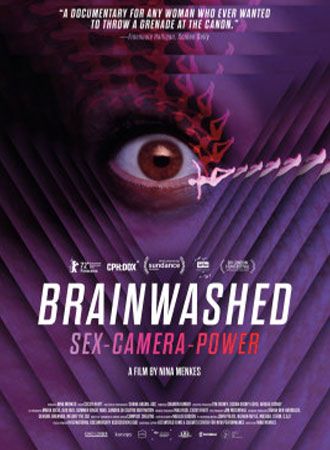
BRAINWASHED: SEX-CAMERA-POWER 2022
Distributed by Kino Lorber Edu, 333 West 39 St, Suite 503, New York, NY 10018; 212-629-6880
Produced by Nina Menkes
Directed by Nina Menkes
Streaming, 107 mins
College - General Adult
Communication Studies; Film Studies; Gender Studies
Date Entered: 01/25/2023
Reviewed by Kimberly Poppiti, St. Joseph's University, Patchogue, NYIn this feature-length documentary, independent filmmaker Nina Menkes argues that the movie-going public has, over the course of cinema history, been effectively “brainwashed” into accepting a disempowering and overly sexualized anti-women bias by what Menkes describes as the powerful “visual language of cinema.” Menkes asserts that this conditioning has led society to view women in film (and, by extension, outside of film) primarily as sexual objects intended to be ogled and acted upon by men. Overall, her points are valid and worthwhile, but there is room for a more balanced approach to the material, as well as for less shaming of viewers who may have found merit in any of the myriad classic films or scenes excerpted by Menkes.
Throughout Brainwashed, Menkes reasons that the powerful repetition of misogynistic and patriarchal imagery has led us to wrongly accept, enjoy, and reward the presentation of damaging anti-woman tropes. Menkes presents this “brainwashing” as a manifestation of the “male gaze” and connects it to a series of deliberate choices relating to the presentation of males as subjects and females as objects on screen. Menkes argues that this is accomplished through specific filmic techniques including: the balance of subject and object, framing, camera movement, lighting, and narrative position. Further, she explains how each of these techniques, especially when used repeatedly, lead viewers to accept a power structure in which female characters are presented and perceived as inherently less than male characters.
Menkes uses film clips to illustrate her points and includes excerpts from her own previous work, including her talk, Sex and Power: The Visual Language of Cinema, and related conversations with various artists, students, and scholars. At a few points, external studies are referenced to connect Menkes’s thesis to larger issues, such as an ongoing lack of diversity and a larger culture of pervasive sexual harassment and abuse (both within and outside the film industry), and beyond this to societal evils including date rape and sexual assault. Toward the end of the film, Menkes briefly considers some recent examples of filmmakers deviating from the dominant problematic paradigm presented.
Menkes makes numerous worthwhile points in this documentary. She identifies and explains a problematic pattern in technical filmmaking and is correct that the oversexualization of female characters and lack of diversity both on screen and behind the scenes are real problems in the film industry. Her analysis of shot design is both interesting and thought-provoking. Brainwashed falls short in a few key areas, including in its reliance on an assortment of film clips which lack examination of context or consideration of possible alternative interpretations; in its use of a pervasively shaming tone toward anyone who enjoys or may have enjoyed mainstream cinema over the past century; and an overall one-sidedness of analysis.
This film is likely to be of greatest interest to students and scholars in the fields of Film Studies, Gender Studies, and Communication Studies. It includes sexual content and is most appropriate for college-aged to general adult-aged audiences.
Awards: 2022 “BEST OF FEST” at Alexandria Film Festival, Virginia; 2022 “BEST OF FESTS” at IDFA
Published and licensed under the Creative Commons Attribution 4.0 license. Anyone can use these reviews, so long as they comply with the terms of the license.